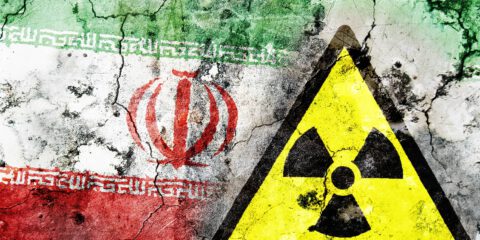Whereas Iran’s destabilizing activities in the Middle East are well known, “peripheral” Tehran activities are coming under the radar. One such direction of Iranian subversion is the Caucasus, Iran’s conflict with the Republic of Azerbaijan. Numerous Iranian media outlets have recently evoked the possibility of a military escalation between Baku and Tehran. The Iranian regime accuses Azerbaijan of all possible manipulations and evil doings, including dispatching ISIS and al-Qaeda Sunni terrorists to fight Iran. The main accusation, however, is of Baku’s collision with Israel (“the Zionist regime,” to quote Iranian officialdom). This article reviews the anti-Azeri actions taken by Iran.
Relations between Azerbaijan and Iran have always been tense. The main driver of conflict is the Azeri population of Iranian Azerbaijan. Though the Azeris make up nearly 40% of Iran’s population, they are deprived of their national rights, such as the right to use their language in the press and education. The Azeris in Iran aspire to more cultural autonomy and home rule, which the Tehran regime denies.
There are also other contentions, such as Iran’s struggle with Azerbaijan over controlling Caspian oil. Azerbaijan hinders Iran from achieving its ambitions in the Caucasus. Nevertheless, Iran cannot fight Azerbaijan directly and has relied on the Moscow-Yerevan-Tehran axis for that purpose since the 1990s. Russia and Armenia want to weaken Azerbaijan. Nevertheless, the primary reason for the tension between Iran and Azerbaijan resides in the discrimination of the Azeris in Iran and the secular pro-Western stance of independent Azerbaijan.
Since the Ukraine war outbreak, Iran has stepped up its cooperation with Russia. Iran has always supported Armenia against Azerbaijan. Russia’s position in the Caucasus has recently weakened, and it cannot help Armenia. Armenia, in turn, is becoming Iran’s pawn in the Iranian game against Azerbaijan. Iranian diversions cannot unfold without using Armenia as a transit hub. The actions undertaken by Armenia help Iranian efforts to weaken Azerbaijan. Iran has always preferred indirect actions.
The former IRGC Quds Force commander Qassem Soleimani founded an Azeri pro-Iranian militia called “Hosseyniyun” in Iran. Iranian agents have always been active in Azerbaijan. Yet Iranian subversion is not confined to covert actions and rabble-rousing rhetoric alone.
Iranian state media started questioning Azerbaijan’s territorial integrity, claiming the Nakhchivan region belongs to Iran. Iranian actions could never be so effective if Iran did not have regional allies. One of these Iranian bedfellows is Armenia. The Tehran regime is transforming the Caucasian country into its military bases and a stronghold to increase tensions with Azerbaijan and help Russia’s aggression against Ukraine. In other words, Armenia is becoming Iran’s client in the Caucasus.
On numerous occasions, Iranian media evoke strategic and security ties with Armenia. Iranian Foreign Minister Hossein Amir-Abdollahian said that Armenia’s security is Iran’s security. Likewise, Iran backs Armenia in its conflict over the Karabakh region against Azerbaijan. There is no legal controversy over the ownership of the territory – it is internationally recognized as a part of Azerbaijan. Even Armenia does not recognize the separatist Karabakh and does not claim ownership over that region. In other words, the conflict in Karabakh is unfolding inside Azerbaijan’s sovereign territory, irrespective of each party’s sympathies and animosities. Armenia cannot promote convincing legal arguments to buttress the legitimacy of its claims. On the international level, for that reason, it resorts to various ever-changing narratives portraying its conflict with Azerbaijan as another genocide and accusing Baku of dispatching Sunni Jihadists to Karabakh. The latter accusation also lines up with Iranian allegations about Sunni jihadists used by Azerbaijan.
On the ground, one can see more evidence that Iran is attributing importance to Armenia beyond just maintaining friendly relations.
Iran’s ambassador to Syria, Mehdi Sobhani, was appointed ambassador to Yerevan. It is well-known that the post of Iranian ambassador in Damascus and Beirut is not merely diplomatic but a military rank because the ambassador coordinates with Hezbollah, the Assad regime, and the IRGC. Therefore, the appointment of Sobhani discloses the military importance that Tehran attributes to Yerevan. The IRGC plans to escalate tensions with Azerbaijan.
Iran’s embassy in Armenia tried to downplay the fears related to Sobhani’s ties to the IRGC. It released a statement rejecting speculation that the appointment of its new ambassador to Yerevan represents an escalation in relations with Azerbaijan. Some flight booking and monitoring websites show that the air carrier Cham Wings carries out at least one weekly flight from Aleppo to Yerevan. Ruthless Syrian and Russian bombings demolished Aleppo, and it is hard to figure out why many Syrian tourists travel to Yerevan. The IRGC and the Quds Force are massively deployed in Aleppo, whereas the IRGC and other Iranian structures use the Cham wings to transfer weapons. Thus, the passage of the IRGC officers from Syria to Armenia or vice-versa is the only plausible explanation for frequent flights from Aleppo to Yerevan to reduce attention from Iran’s involvement in Amenia. That is an alternative to direct flights from Iran to Armenia.
Reports say Armenia has already purchased some Iranian-made drones and targeted them with Azeri positions. That is further evidence that Iran works to escalate tensions between Armenia and Azerbaijan through its “drone diplomacy.”
Armenia was seeking to purchase Iranian drones already in 2022. Iranian officials also confirmed Armenia’s desire to purchase UAVs from Iran. Despite both Iranian and Armenian denials, Azeri, Turkish, and even Iranian informal media have reported the Armenian armed forces’ usage of an Iranian drone against Azeri forces. The Zangezur corridor, which is supposed to pass along Armenia’s and Iran’s border, bears enormous importance for both Iran and Azerbaijan, although it is situated on Armenian soil. If Baku accomplishes its control over that territory, it will connect Azerbaijan to Turkey and then to Europe. The potential realization of the Zangezur corridor, which could link Azerbaijan’s western provinces with the Azeri Nakhchivan enclave along the Turkish border, is very significant in economic and geopolitical terms. As Iran rejects this Azeri project, it forces Armenia to engage in more skirmishes over the Zangezur corridor. Iran opened its new consulate in the Armenian city of Kapan, close to the Syunik and the Zangezur corridor.
In the meantime, Iranian media are whipping up war hysteria against Azerbaijan. Some openly maintain that the Iranian consulate in Kapan is insufficient to protect Iran’s interests. Others argue that Iran needs to beef up its military presence in Armenia. Some Iranian politicians spoke out for establishing an Iranian military base in Armenia because Armenia is interested in such a base and to counter the Baku regime and its Zionist allies. Prof. Sayed Hassan Amin proposed in 2021 that Iran, as the Islamic Republic, should develop a military presence in Armenia and the South Caucasus, as it has in Iraq and Syria. Naturally, Iran cannot carry out these plans without Armenia’s consent.
Of course, it is Armenia’s right to maintain relations with Russia and Iran – it simply cannot afford not to have ties with these regimes. Yet it appears that the scope of Armenia’s cooperation with Iran is significantly broader than the normal relationship between the two countries. Its cooperation with Iran increases instability in the region and facilitates Iran’s subversive actions in the region. Moreover, Iranian and Armenian media have no qualms about inserting antisemitic statements regarding Azerbaijan-Israel ties.
The portrayal of Iranian outright aggressive steps (such as border military drills) is insufficient for fighting Iranian influence against Israel’s partners. Given that Iran has long preferred asymmetric warfare and indirect action, it is necessary to investigate and explain how Iran operates against Azerbaijan on numerous levels. Iran and those who actively assist it must be aware of the gravity of their acts.
Photo: IMAGO / APAimages









 - בניית אתרים
- בניית אתרים